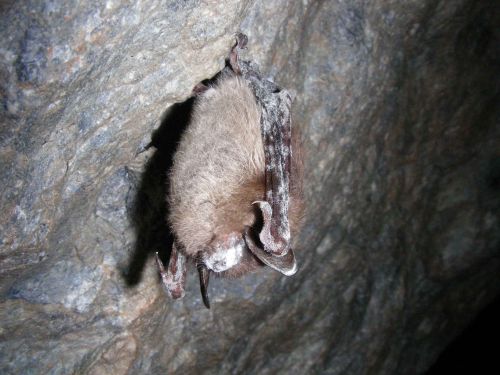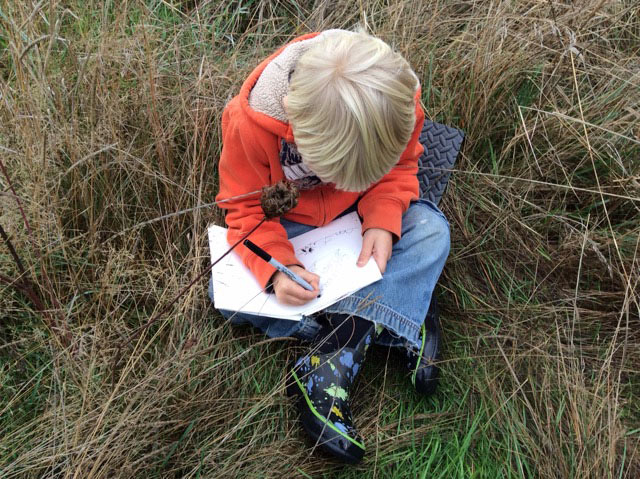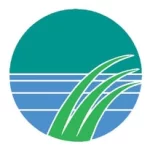
White Nose Syndrome (WNS), a fungal disease responsible for the death of millions of bats in eastern North America, has moved to the west coast and was confirmed in Washington State in 2016. This is very worrisome for the health of bat populations in British Columbia, with near 100% mortality for some species of bats exposed to the fungus. Although devastating for bats, WNS does not affect humans.
The BC Community Bat Program in collaboration with the BC government is requesting the public’s help in monitoring the spread of this disease. “We knew this deadly fungus was moving westward across North America” says Mandy Kellner, Coordinator of the BC Community Bat Program, “but we thought we had many years to prepare”. Instead, the disease was confirmed near Seattle last March, and the group is gearing up to look for it in BC this winter.
The typical first sign of this disease is bats flying during the winter, an unusual sighting at a time of year when bats are hibernating. Another sign of the presence of WNS is the appearance of dead bats as they succumb to the effects of WNS. “We are encouraging the public to report dead bats or any sightings of winter bat activity to the Community Bat Project (CBP) toll-free phone number, website, or email below. Bat carcasses will be submitted for testing for White Nose Syndrome and would provide the earliest indication of the presence of the disease in BC” says Kellner. Reports of winter bat activity will help focus research, monitoring and protection efforts.
If you find a dead bat, report it to the CBP (1-855-922-2287 ext 24 or info@bcbats.ca) as soon as possible for further information. Never touch a dead bat with your bare hands. Please note that if you or your pet has been in direct contact with the bat you will need further information regarding the risk of rabies to you and your pet.
Currently there are no treatments for White Nose Syndrome. However, mitigating other threats to bat populations and preserving and restoring bat habitat may provide bat populations with the resilience to rebound. This is where the BC Community Bat Program and the general public can help.
Funded by the Habitat Conservation Trust Foundation, the Province of BC, and the Habitat Stewardship Program, the BC Community Bat Program works with the government and others on public outreach activities, public reports of roosting bats in buildings, and our citizen-science bat monitoring program.
To contact the BC Community Bat Program, see www.bcbats.ca, email info@bcbats.ca or call 1-855-922-2287 ext. 24.
HCTF is providing funding for the BC Community Bat Program through grants to project 0-476, Got Bats? B.C. Community Outreach, Conservation and Citizen Science Project





 We are thrilled to be starting 2017 with a new staff member! Christina Waddle has joined HCTF as our Conservation Specialist. This is a new position at HCTF, created to help administer our growing investments in conservation lands management, as well as our acquisition and fisheries operations & maintenance granting programs. Christina has a wealth of experience in both administration and conservation lands management. She completed her Bachelor of Science degree with the University of Manitoba in 2001. Following graduation, she moved to Victoria and began working for The Land Conservancy of BC in various positions, eventually as Regional Manager for Vancouver Island. More recently, she spent 5 years with the University of Victoria’s Ocean Networks Canada in administrative roles. Welcome Christina!
We are thrilled to be starting 2017 with a new staff member! Christina Waddle has joined HCTF as our Conservation Specialist. This is a new position at HCTF, created to help administer our growing investments in conservation lands management, as well as our acquisition and fisheries operations & maintenance granting programs. Christina has a wealth of experience in both administration and conservation lands management. She completed her Bachelor of Science degree with the University of Manitoba in 2001. Following graduation, she moved to Victoria and began working for The Land Conservancy of BC in various positions, eventually as Regional Manager for Vancouver Island. More recently, she spent 5 years with the University of Victoria’s Ocean Networks Canada in administrative roles. Welcome Christina!



